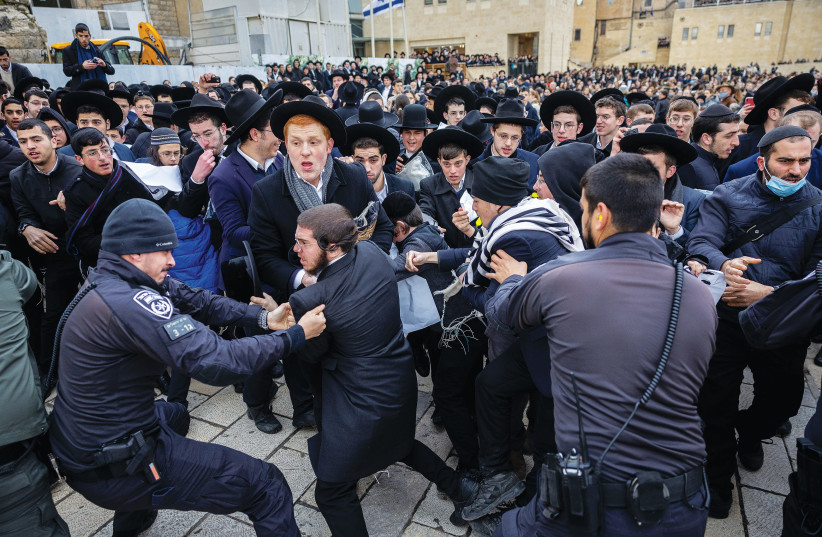Imagine the following situation taking place in an American city: the scene is a local egalitarian Conservative synagogue where congregants are holding a weekday morning Shacharit service.
Suddenly, during the Amidah, a group of right-wing extremists storm into the chapel and begin shouting obscenities and spitting on the worshipers, who are caught off guard and are now panicked. The hooligans grab prayer books from the shelves, ripping out pages and throwing them on the floor. Before leaving, one of them wipes his nose with a torn-out page, sneering condescendingly, proud of his vulgar act.
Such a shocking antisemitic incident would, of course, spark an outcry from Jewish groups around the country. The local police and FBI would be counted on to open an immediate investigation and find and arrest the perpetrators of this hate crime. Strong statements of condemnation would be issued by, and offers of support received from, many of the local Jewish community’s interfaith partners. The US president would likely reach out to the leadership of the targeted synagogue in a show of solidarity.
What if, however, the assailants weren’t white nationalists? What if they were – Jews? And what if the incident occurred not in America but in the Jewish state? Would we still call it antisemitism, or would we mute our outrage lest our condemnation provide fodder for the Israel-bashers?
Israel's Western Wall violence is perverse and disturbing
Anyone familiar with my work and my writing knows that I am a committed Zionist, readily defending Israel against unjust, false accusations such as “apartheid” and “genocide.” But there is something perverse and disturbing going on in Israel about which, as an American Jew, I cannot remain silent.

Recent months have seen a significant escalation in violence directed at women and non-Orthodox Jews praying at the Western Wall. Even egalitarian ceremonies held in the southern section of the holy site, which is specifically designated for mixed-gender prayer, have been violently disrupted by haredi Orthodox extremists.
The appalling actions described above actually took place in the egalitarian section during three June b’nei mitzvah ceremonies, one of them that of Seth Mann of Las Vegas. American Jews, who came to Jerusalem to celebrate a coming-of-age in the Jewish faith, were overrun by a mob of haredi youth and denounced as “Nazis.” Inexplicably, the police witnessed the attack yet did nothing to stop it.
Writing in the Times of Israel, Seth’s father lamented, “I realized that not even in the State of Israel, the homeland for the Jewish people, am I allowed to pray freely and safely.” Another father noted, “This is what the Nazis would do – and they called us Nazis.”
“Make no mistake. Had such a hateful incident – such incitement – happened in any other country, there’d be little hesitation in labeling it antisemitism.”
US antisemitism envoy Deborah Lipstadt
Deborah Lipstadt, the US antisemitism envoy, tweeted, “Make no mistake. Had such a hateful incident – such incitement – happened in any other country, there’d be little hesitation in labeling it antisemitism.”
The following month, the family of a teenage Jewish girl from Seattle, celebrating her bat mitzvah at the Western Wall alongside the Women of the Wall, was harassed by a swarm of haredi yeshiva students. And once again the police, who were hired by the government-funded group that manages the holy site, refused to enforce Israel’s law prohibiting the disturbance of prayers. Back home in Seattle, the girl’s mother, who said she has sometimes been vilified in the US for being a proud Zionist, noted ironically that in Israel her family was “attacked for being... Jews.”
For Jewish professionals like myself who work determinedly to build support for Israel, especially among the younger generation of American Jews, what message is Israel sending when hate-filled zealots are free to unleash a torrent of antisemitic abuse at peaceful non-Orthodox worshipers?
Sadly, very few members of Knesset condemned the disturbances. And although the Western Wall rabbi, Shmuel Rabinovitch, denounced “the verbal and occasional physical violence” at the holy site, he appeared to blame “all sides” for the problem.
Prime Minister Yair Lapid did speak out against the provocations, calling them “unacceptable.” In a phone call to Seth Mann, Lapid declared that he was “horrified” by what had occurred during Mann’s bar mitzvah ceremony, and that “it doesn’t represent the country or the people of Israel.”
Supportive statements are important, but they’re no substitute for concrete actions. At a minimum, the prime minister needs to ensure that the non-Orthodox section remains fully open to egalitarian prayer, and instruct police to intervene to prevent any disruptions while keeping worshipers safe there.
Bottom line: Israeli leaders need to decide what kind of country they want Israel to be – a Jewish state that respects all streams of Judaism, or one that, for reasons of political expediency, tolerates behavior that constitutes a desecration of God’s name. The choice couldn’t be clearer. ■
The writer is director of Community Relations and Public Affairs at the Jewish Federation of Greater Portland.
